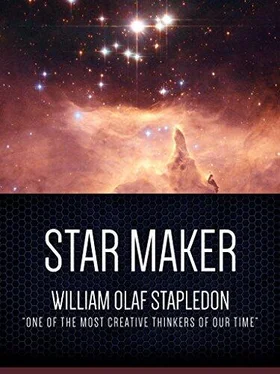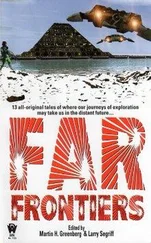Bvalitu was not convinced by this story. On the whole he inclined to the opinion that the rhythmical waxing and waning of human mentality was due to causes nearer home. Whatever the true explanation, it was almost certain that a high degree of civilization had been attained many times in the past, and that some potent influence had over and over again damped down the mental vigor of the human race. In the troughs of these vast waves Other Man sank to a state of mental and spiritual dullness more abject than anything which my own race had ever known since it awoke from the subhuman. But at the wave's crest man's intellectual power, moral integrity, and spiritual insight seem to have risen to a pitch that we should regard as superhuman.
Again and again the race would emerge from savagery, and pass through barbarian culture into a phase of worldwide brilliance and sensibility. Whole populations would conceive simultaneously an ever-increasing capacity for generosity, self-knowledge, self-discipline, for dispassionate and penetrating thought and uncontaminated religious feeling.
Consequently within a few centuries the whole world would blossom with free and happy societies. Average human beings would attain an unprecedented clarity of mind, and by massed action do away with all grave social injustices and private cruelties. Subsequent generations, inherently sound, and blessed with a favorable environment, would create a world-wide Utopia of awakened beings.
Presently a general loosening of fiber would set in. The golden age would be followed by a silver age. Living on the achievements of the past, the leaders of thought would lose themselves in a jungle of subtlety, or fall exhausted into mere slovenliness. At the same time moral sensibility would decline. Men would become on the whole less sincere, less self-searching, less sensitive to the needs of others, in fact less capable of community. Social machinery, which had worked well so long as citizens attained a certain level of humanity, would be dislocated by injustice and corruption. Tyrants and tyrannical oligarchies would set about destroying liberty. Hate-mad submerged classes would give them good excuse. Little by little, though the material benefits of civilization might smolder on for centuries, the flame of the spirit would die down into a mere flicker in a few isolated individuals. Then would come sheer barbarism, followed by the trough of almost sub-human savagery.
On the whole there seemed to have been a higher achievement on the more recent crests of the wave than on those of the "geological" past. So at least some anthropologists persuaded themselves. It was confidently believed that the present apex of civilization was the most brilliant of all, that its best was as yet to come, and that by means of its unique scientific knowledge it would discover how to preserve the mentality of the race from a recurrence of deterioration.
The present condition of the species was certainly exceptional. In no earlier recorded cycle had science and mechanization advanced to such lengths. So far as could be inferred from the fragmentary relics of the previous cycle, mechanical invention had never passed beyond the crude machinery known in our own mid-nineteenth century. The still earlier cycles, it was believed, stagnated at even earlier stages in their industrial revolutions.
Now though it was generally assumed in intellectual circles that the best was yet to be, Bvalltu and his friends were convinced that the crest of the wave had already occurred many centuries ago. To most men, of course, the decade before the war had seemed better and more civilized than any earlier age. In their view civilization and mechanization were almost identical, and never before had there been such a triumph of mechanization. The benefits of a scientific civilization were obvious. For the fortunate class there was more comfort, better health, increased stature, a prolongation of youth, and a system of technical knowledge so vast and intricate that no man could know more than its outline or some tiny corner of its detail. Moreover, increased communications had brought all the peoples into contact. Local idiosyncrasies were fading out before the radio, the cinema, and the gramophone. In comparison with these hopeful signs it was easily overlooked that the human constitution, though strengthened by improved conditions, was intrinsically less stable than formerly. Certain disintegrative diseases were slowly but surely increasing. In particular, diseases of the nervous system were becoming more common and more pernicious. Cynics used to say that the mental hospitals would soon outnumber even the churches. But the cynics were only jesters. It was almost universally agreed that, in spite of wars and economic troubles and social upheavals, all was now well, and the future would be better.
The truth, said Bvalitu, was almost certainly otherwise. There was, as I had suspected, unmistakable evidence that the average of intelligence and of moral integrity throughout the world had declined; and they would probably continue to do so. Already the race was living on its past. All the great seminal ideas of the modern world had been conceived cen-turies ago. Since then, world-changing applications of these ideas had indeed been made; but none of these sensational inventions had depended on the extreme kind of penetrating the whole course of thought in an earlier age. Recently there had been, Bvalltu admitted, a spate of revolutionary scientific discoveries and theories, but not one of them, he said, contained any really novel principle. They were all re-combinations of familiar principles. Scientific method, invented some centuries ago, was so fertile a technique that it might well continue to yield rich fruit for centuries to come even in the hands of workers incapable of any high degree of originality.
But it was not in the field of science so much as in moral and practical activity that the deterioration of mental caliber was most evident. I myself, with Bvalltu's aid, had learnt to appreciate to some extent the literature of that amazing period, many centuries earlier, when every country seemed to blossom with art, philosophy and religion; when people after people had changed its whole social and political order so as to secure a measure of freedom and prosperity to all men; when state after state had courageously disarmed, risking destruction but reaping peace and prosperity; when police forces were disbanded, prisons turned into libraries or colleges; when weapons and even locks and keys came to be known only as museum pieces; when the four great established priesthoods of the world had exposed their own mysteries, given their wealth to the poor, and led the triumphant campaign for community; or had taken to agriculture, handicrafts, teaching, as befitted humble supporters of the new priestless, faithless, Godless religion of world-wide community and inarticulate worship. After some five hundred years locks and keys, weapons and doctrines, began to return. The golden age left behind it only a lovely and incredible tradition, and a set of principles which, though now sadly misconceived, were still the best influences in a distraught world.
Those scientists who attributed mental deterioration to the increase of cosmic rays affirmed that if the race had discovered science many centuries earlier, when it had still before it the period of greatest vitality, all would have been well. It would soon have mastered the social problems which industrial civilization entails. It would have created not merely a "mediaeval" but a highly mechanized Utopia. It would almost certainly have discovered how to cope with the excess of cosmic rays and prevent deterioration. But science had come too late. Bvalltu, on the other hand, suspected that deterioration was due to some factor in human nature itself. He was inclined to believe that it was a consequence of civilization, that in changing the whole environment of the human species, seemingly for the better, science had unwittingly brought about a state of affairs hostile to spiritual vigor. He did not pretend to know whether the disaster was caused by the increase of artificial food, or the increased nervous strain of modern conditions, or interference with natural selection, or the softer upbringing of children, or to some other cause. Perhaps it should be attributed to none of these comparatively recent influences; for evidence did suggest that deterioration had set in at the very beginning of the scientific age, if not even earlier. It might be that some mysterious factor in the conditions of the golden age itself had started the rot. It might even be, he suggested, that genuine community generated its own poison, that the young human being, brought up in a perfected society, in a veritable "city of God" on earth, must inevitably revolt toward moral and intellectual laziness, toward romantic individualism and sheer devilment; and that once this disposition had taken root, science and a mechanized civilization had augmented the spiritual decay.
Читать дальше









![Олаф Стэплдон - Создатель звезд [сборник litres]](/books/433148/olaf-stepldon-sozdatel-zvezd-sbornik-litres-thumb.webp)


